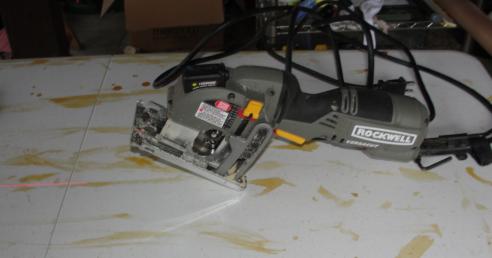The Joy of Unemployed Resources
I [Carl] am not a carpenter, and I don’t play one on TV. Yet I do have a nice collection of power tools in my repurposed garage. Check out my nifty Rockwell Versa Cut. It’s much easier for an amateur like me to get a straight cut with it than with a full-sized circular saw (despite the Versa Cut’s uncomfortable trigger location).

There’s a dirty little secret about my little Rockwell saw: most of the time it sits idle. I use it something like 20 days out of the year – partial days at that. Over 95% of the year it sits unplugged. Over 99% of the year it is off. It’s AN UNEMPLOYED RESOURCE!!
Such is the logic of Keynesian Economics. This is barely a parody. During the Great Depression the government was fining farmers for growing their own livestock feed. The Constitution was effectively amended by the Supreme Court in order to enable such silliness.
I have different words for what the Keynesians call Unemployed Resources: Wealth, Slack, Reserves, Resilience, Savings, Peace of Mind. This is why I so loathe Keynesian Economics. It is harming the environment, stressing out the people, and bankrupting the treasury. The Keynesian prescriptions are the root reasons why we in the United States are so nominally rich yet not so happy.
For those think I am just a dabbler in capital equipment, let’s here from Steve, who is a farmer and plays one on YouTube:
As a small farmer, I have to admit that I covet my neighbor's.......well........tractors. His wife is cute, sure, but those tractors, mmmmm, mmmmm. You see, I have a couple of good tractors. They have hitches on the back that hook up different implements for different tasks like plowing, tilling, post hole drilling, bush hogging, etc. Some of them require power from the power take off (PTO) on the back of the tractor. Both of my tractors are great multi-taskers. But here's the the thing. It can be a bitch hooking up those implements in a hurry and there are some tasks where it takes a lot of alternating implements. My neighbor, let's call him Jerry because that's his actual name, has been farming a long time and has been very successful. Over the years he's taken care of his equipment, keeping all his tractors great running condition. So, when he decides to buy a new #1 main tractor, his previous one goes into a part-time situation where it gets a dedicated implement. For example, he has one tractor with a dedicated bush hog on it specifically for mowing. He has another that has a big articulating grader blade on the back and is used specifically for grading. He's got an old International 140 that has a PTO driven sprayer on the back specifically for cleaning his house and farm buildings, and, another 140 for discing his garden. The one I covet most is a little John Deere 2020 that he uses for knock-around odd jobs, like towing trailers. The beauty of having all these backups is that it's so easy to just jump on whatever rig required for the current task, and, anytime New Number 1 is taken out of service for maintenance or repair, Jerry has a practical fleet of choices to temporarily take it's place.
There's another aspect to this that is seemingly counter-intuitive in our modern throwaway, planned obsolescence society. Jerry has given himself this enviable buffer because he bought tractors that were built to last, he took good care of them, and over time he learned to make even the most difficult repairs to them himself. And, he enjoys fixing things. There is a sense of accomplishment there that most people these days never experience. This is part of a quality lifestyle where work, tools, and accomplishments have meaning. And there's a lot of value in that.
Unemployed Resources vs. Economic Growth
I am typing this article at a computer table I built myself. It is a crude early effort. My rough carpentry juxtaposed with modern computers gives my office a bit of a post-apocalyptic B movie aesthetic.

But the table is far sturdier that the particle board crap available at a price similar to what I paid for the lumber, and my table is a couple inches higher than standard desks and tables. This allows me to lean back in my chair, rest my elbows on the arms of my chair and keep my wrists bent slightly forward while typing. This is the exact opposite of the torture-your-secretary position so often touted as ergonomic. Going “off grid” for my furniture allows me to have custom furniture without paying insanely high prices at the artsy-fartsy furniture store.
Had I put in more hours at the day job in order to buy furniture at the aforementioned store, however, GDP would be higher, thousands of dollars higher when you throw in all the bookshelves I have built over the years. I have failed to do my duty to maximize the Gross Domestic Product.
Were we to crack down on Unemployed Resources, we could indeed keep those dollars moving.
The Circular Flow goes around and around and we work and shop until we drop to appease the Keynesian god.
No thanks. (And this applies as well to the Keynesians on the Right who have looted the national treasury over the past few decades. Deficits matter.)
Growth is great when you don’t have enough stuff. Africa could use a good deal more GDP growth. But for the rich countries of the world, it’s time to look beyond GDP to living the good life.
A Society with Slack
Remember all those factory jobs which have been outsourced overseas or rendered obsolete by automation? Those good-paying union jobs? Once upon a time left-thinking people had other words for such jobs: Boring, Monotonous, Alienating, Dehumanizing, Evil Exploitation.
It is not work itself that is evil. People often do work for pleasure without pay: hunting, gardening, hobbies, etc. It is the excess, and insect-like division of labor that takes the art out of Artisan.
The antlike life of the Industrial Revolution should be remembered as a historical hack, not a model for the future. It was a response to poverty, to a shortage of capital, a shortage of savings. The power of repetition is overrated. True, a long time oyster shucker can be far more productive than a day laborer at the task, but for the many simpler assembly line jobs, mastery comes in hours or a few days. Diminishing returns set in. Additional productivity is not worth the loss of humanity.
The true magic of the assembly line was not in turning humans into robots; it was making full use of expensive specialized tools. Consider an artisan building a complicated assembly end-to-end with comparable tools. To get some of the flow of an assembly line, he could work in batches at each work station. This is inventory to be financed. But while he works at one station, the other workstations lie idle. Expensive specialized tools charge interest while doing nothing. Return on scarce capital drops. And so in the days when we first tooled up to modern machinery, we reduced our artisans to dehumanized cogs in a great machine in order to keep the expensive tools running.
The next major step to human thriving is not mass quantities of consumer products to fill our closets; it’s living the good life while working. This requires more capital, more savings. Unemployed Resources.
Farms, Factories, and Community
Then again, a bit of mass-production now and then is not a bad thing. Even peasants and primitives did it from time to time. It’s demanding that people work at harvest intensity year around that is dehumanizing.
Suppose we apply the idea of surplus savings – Unemployed Resources – to the factory as a whole. More people could go back to living close to the land. During the growing season, the factories run at partial capacity or not at all, as those with small farms work the land. During the winter, when farm work is at a minimum, the factories build up inventory. During the harvest, the factories close down. Instead of migrant workers living through an extended harvest season – a brutal practice – indoor workers take a break from their jobs to pick the fruit and vegetables. We restore the ancient rhythm of life while enjoying the luxuries of the modern age.
This could happen with surplus savings, when labor becomes more expensive than capital, when our leaders reject their irrational fear of Unemployed Resources.
You can comment on this chapter here.
(Link should open in a new window so you can see comments and text side by side.)